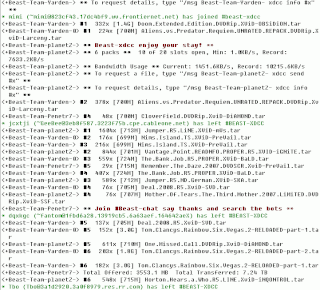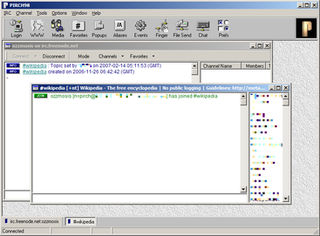Related Research Articles

Internet Relay Chat (IRC) is a text-based chat system for instant messaging. IRC is designed for group communication in discussion forums, called channels, but also allows one-on-one communication via private messages as well as chat and data transfer, including file sharing.

SimpleText is the native text editor for the Apple classic Mac OS. SimpleText allows text editing and text formatting, fonts, and sizes. It was developed to integrate the features included in the different versions of TeachText that were created by various software development groups within Apple Computer.

XDCC is a computer file sharing method which uses the Internet Relay Chat (IRC) network as a host service.

System 7, codenamed "Big Bang", and also known as Mac OS 7, is a graphical user interface-based operating system for Macintosh computers and is part of the classic Mac OS series of operating systems. It was introduced on May 13, 1991, by Apple Computer It succeeded System 6, and was the main Macintosh operating system until it was succeeded by Mac OS 8 in 1997. Current for more than six years, System 7 was the longest-lived major version series of the classic Macintosh operating system. Features added with the System 7 release included virtual memory, personal file sharing, QuickTime, QuickDraw 3D, and an improved user interface.

PIRCH or pIRCh is a shareware Internet Relay Chat (IRC) client published by Northwest Computer Services. Its name is an acronym – PolarGeek's IRCHack.

Eggdrop is a popular IRC bot and the oldest that is still being maintained.
MacWeb is an early, now discontinued classic Mac OS-only web browser for 68k and PowerPC Apple Macintosh computers, developed by TradeWave between 1994 and 1996.
Flooding or scrolling on an IRC network is a method of disconnecting users from an IRC server, exhausting bandwidth which causes network latency ('lag'), or just disrupting users. Floods can either be done by scripts or by external programs.
Tidbits is an electronic newsletter and web site dealing primarily with Apple Inc. and Macintosh-related topics.

Adam C. Engst is a technology writer and publisher who resides in Ithaca, New York, United States where he was born and went to college at Cornell University.
The Talking Moose is an animated talking utility for the Apple Macintosh. It was created in 1986 by Canadian programmer Steven Halls. It is the first animated talking agent on a personal computer and featured a moose that would appear at periodic intervals with some joke or witticism. The moose would also comment on system events and user actions and could speak what a user typed using the Moose Proof desk accessory.

Elizabeth Castro, sometimes known as Liz Castro, is an American author and translator best known for her books aimed to educate the reader on particular aspects of website development, such as HTML and Perl. From 1987 to 1993 Castro lived in Barcelona and managed the translation of computer programs. In 1993 she moved back to the United States to write books about using the internet and World Wide Web.

Robin Patricia Williams is an American educator who has authored many computer-related books, as well as the book Sweet Swan of Avon: Did a Woman Write Shakespeare?. Among her computer books are manuals of style The Mac is Not a Typewriter and numerous manuals for various macOS operating systems and applications, including The Little Mac Book.

The Berkeley Macintosh Users Group, or more commonly "BMUG", was the largest Macintosh User Group. It was founded in September 1984 by a group of UC Berkeley students including Reese Jones and Raines Cohen as a focal-point for the nascent Apple Macintosh user community. With more than 13,000 members, or "BMUGgers" at its peak in 1993, the group was the largest, and generally understood to be the most important, Macintosh users group. A few of the notable members include John "Captain Crunch" Draper, the Sultan of Brunei Hassanal Bolkiah, notorious murderer Enrique Zambrano, early hacker-chaser Cliff Stoll, Inktomi founder Eric Brewer, and may prominent computing journalists like John Dvorak, Ilene Hoffman, Leo Laporte and Adam Engst. An example of the group's omnipresent blue-floppy-disk lapel pin is held in the Smithsonian Institution's American History collection. BMUG's history and activities were closely linked with the MacWorld Expo meetings, traditionally held in San Francisco each January and Boston each August.
SoundApp is a freeware audio player for the Classic Mac OS. It was among the earliest MP3 players for the Classic Mac OS, and was widely praised for its ability to play back, and convert between, a variety of audio file formats.
Peachpit is a publisher of books focused on graphic design, web design, and development. Peachpit's parent company is Pearson Education, which owns additional educational media brands including Addison-Wesley, Prentice Hall, and New Riders.
InterCon Systems Corporation was founded in April 1988 by Kurt D. Baumann and Mikki Barry to produce software to connect Macintosh computers in environments that were not Macintosh-exclusive. At the time, there was no real concept of the Internet and there was still a question of whether the TCP/IP protocols or OSI protocols would be adopted widely. Over the next 9 years, the company grew from three employees to over 100 and sold software in the US, Europe and Japan.
Ircle was an IRC client developed by Onno Tijdgat for the Macintosh computer platform. Ircle was shareware, with free upgrades. The client was scriptable with AppleScript, supported multiple channels and servers, and up to ten simultaneous connections. It was discontinued in 2009. Since 2012, Ircle was not compatible with most recent versions of OS X, and no updates were available. In December 2017 the Ircle home page displayed a poll, to end Q2 2018, to determine whether a new version should be released on OS X and iOS. The results of the poll were 311 votes in favor of a new Mac OS version, 43 votes for an iOS version, and 117 votes for both a Mac OS and iOS version, out of 528 votes cast.
Stuart H. Harris is an English author of books and articles about the internet, and internet consultant, now living in California, United States. He is a computer professional, an expert on IRC and has written a book on the subject, IRC Survival Guide: Talk to the World with Internet Relay Chat, published in 1995 by Addison-Wesley. He is also a performer with three years experience as a semi-professional actor on the festival circuit, two years as a professional in London and in provincial repertory theatre, and further experience as a director in television. The aforementioned extensive cross-disciplinary experience motivated Harris to explore the potential of creating a Shakespeare performance online; namely, a contemporary production of Shakespeare's Hamlet known as Hamnet.
NewsWatcher was a series of freeware and open source newsreader software for Apple Macintosh computer systems. Running on System software versions 7.0 until 10.5, the original NewsWatcher was written by Steve Falkenberg and John Norstad, and later forked by others into a number of versions such as MT-NewsWatcher, VA-NewsWatcher and YA-NewsWatcher.
References
- ↑ Eddy, Andy (1996). Internet After Hours (2nd ed.). Prima Publishing. p. 217. ISBN 978-0-7615-0386-6.
- ↑ "Homer". Blue Cow Software. Archived from the original on 2000-08-16.
- ↑ Engst, Adam C. (1994). Internet Starter Kit for Macintosh (2nd ed.). Hayden Books. p. 315. ISBN 978-1-56830-064-1.
- 1 2 Engst (1994), pg. 653.
- ↑ Staplehurst, John. "Macintosh IRC Software : Homer". Exeter College, University of Cambridge. Archived from the original on 2008-12-25.
- ↑ Harris, Stuart (1995). The irc survival guide. Addison-Wesley. p. 144. ISBN 9780201410006.
- ↑ "Quickstart guide for those new to IRC". OZmac.org, the OZ.org #macintosh IRC channel website. Archived from the original on 2003-12-03.
- ↑ Herring, Susan C. (1996). Computer-mediated communication: linguistic, social, and cross-cultural perspectives. John Benjamins Publishing. p. 63. ISBN 978-90-272-5054-4.